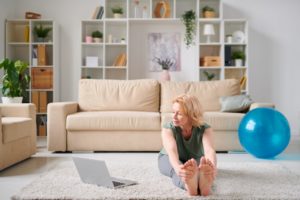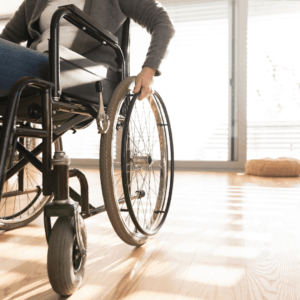Facts about falls you probably don’t know….
Fear of falling affects approximately 50% of older people who have fallen and up to 50% who have never fallen, and this can lead to social isolation because of reduced confidence and independence.1,2
In the UK, one third of over 65s fall at least once each year, increasing to 50% for those over the age of 80.3,4
Following a fall, 50% of older people experience serious mobility impairments and there is a 10% probability of dying within a year.5,1
Shocking, isn’t it?!? But rest assured, there is always something you can do! So, to help you, here are some simple and effective ways to instantly reduce the risk of falling:
- Lift all your rugs, particularly those at the top and bottom of stairs, as they are a trip hazard! If they are a beautiful feature which you can’t live without, then at the very least, secure them down with tacks/double-sided tape.
- Remove trip hazards from walkways such as trailing wires, clutter, coffee tables/magazine racks and potted plants.
- Clean up spills immediately!
- Store clothing, food, dishes, cleaning products etc. within reaching distance ¬– not too high or too low.
- Use non-slip mats in baths and bath seats/handles while showering to prevent slipping.
- Wear properly fitted, sensible shoes inside and out to prevent slipping, skidding or stumbling. Only wear slippers with good grip that fasten and stay on properly and never walk about in socks/tights!
- Use night lights, particularly between the bedroom and bathroom for nighttime visits and have a torch handy. You can even install a motion activated light that comes on as needed.
- Make sure stairwells are well lit and have handrails on either side.
- Manage your medicines by visiting your GP or Falls Clinic for a full work up. Be aware that certain medications can make you feel sleepy, dizzy and affect your balance.
- Get your eyes tested regularly (at least every 2 years) and make sure your glasses prescription is current. Also, get your hearing checked as problems with your ears can severely affect your balance.
- Avoid unnecessary trips up and down stairs by thinking what you need for the day and have multiple versions of items in different parts of the house e.g. have phones dotted about the place and maybe even carry one in your pocket!
- Consider using assistance devices like canes/walkers if you feel unsteady as these will give you the confidence to remain active which is so important!
Don’t become a statistic, act now! Make these few simple changes to prevent falls and help yourself to stay accident free!
All this information may seem rather daunting. We understand that it may not be easy to deal with on your own and are certain that you will still have questions. So why not contact us:
info@srphysio.co.uk
appointments@srphysio.co.uk
01603-208-238
- Age UK. Falls Prevention Exercise – following the evidence. London: Age UK; 2013.
- Parry SW, Bamford C, Deary V, et al. Cognitive-behavioural therapy-based intervention to reduce fear of falling in older people: therapy development and randomised controlled trial – the Strategies for Increasing Independence, Confidence and Energy (STRIDE) study. Health Technol Assess. 2016;20(56):1206.
- Public Health England. Falls and fracture consensus statement. Supporting commissioning for prevention London: Public Health England; 2017.
- National Institute for Health and Care Excellence. Falls in older people: assessing risk and prevention. London: National Institute for Health and Care Excellence; 2013.
- NHS RightCare. RightCare Pathway: Falls and Fragility Fractures. London NHS RightCare;



